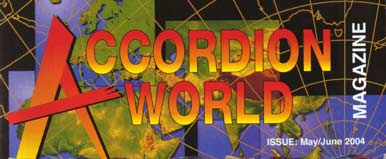
The review was written by Bernard Snook and is presented here by the permission of Accordion World.
(See our review of Accordion World Magazine) .

|
The following review was originally published in the May/June 2004 edition of Accordion World magazine (editor: David Keen). The review was written by Bernard Snook and is presented here by the permission of Accordion World. (See our review of Accordion World Magazine) . |
Following Richard Galliano's massively successful UK tour two years ago and his appearance at the Brecon Jazz Festival in Wales last August, he returned to the UK for a tour of the major cities of Bristol, Manchester, London and Cambridge during the period 11th to 16th March, 2004.
In this tour the virtuoso French accordionist and bandoneon player celebrated the music of his guide, mentor and friend Astor Piazzolla--the legendary tango composer and inventor of 'Tango Nuevo'. Piazzolla's influence on Galliano led him to create music that was an intensely personal response to his roots in traditional French music and to his understanding of the jazz tradition. Galliano's tribute to a musical friendship that lasted until Piazzolla's death on 4th July 1992 was described by his promoters, Serious, as music of "both heart-rending lyricism and bruising power".
A few years ago Galliano wrote:
"When I was a child, I dreamed of some day being a concert artist. However, having chosen very early the accordion and later the bandoneon as my principle instruments, I was faced with the problem of repertoire. What should I play? Bach? Berio? Scarlatti? Why not? That is certainly possible, but up until meeting Astor Piazzolla in the early 1980's, I had trouble finding the right fit for my instrument. I didn't want to break with the history of the accordion. Musette dance music is only one aspect, although a very interesting one, of music that can be played on the accordion. After observing Astor Piazzolla and his works, I realized that what I needed, at least in the short term, was to follow a parallel path to his. This idea, which has folk and popular music as a starting point and moves in the direction, not of 'serious' music (because I think that all good music is serious), but let's say music that is precise, orchestrated, thought through, and written down. The problem remained of finding a group of classical musicians who could play a tango, a waltz, or a ballad with swing."From the first few bars of his London concert at the Barbican on Saturday 13th March, it was abundantly evident Galliano had made the right choice of artists for his Septet. His deeply personal understanding of Piazzolla's extraordinary musical vision was realized with rare insight, and the whole performance was charged with strong vibes of energy--an energy that had an incredible power to reach out, enchant and elevate his audience. His seven-piece group consisted of players on piano, three violins, viola, cello, and double-bass.
Although Galliano produced a very authentic bandoneon-like sound from his Victoria accordion, he used a genuine traditional Alfred Arnold bandoneon for nearly half of his programme. For many in the large audience of 1,500 it was the first time they had seen and heard Galliano playing the bandoneon, and it revealed what a talented performer he is, not only on his beloved accordion, but also on the instrument that projected Piazzolla into 'megastardom' in the international musical firmament. He also used the distinctively pure and dulcet tones of his 'Accordina' or button-keyed harmonica, for several compositions which featured a prominent lyrical melody. It is worthy of note that Galliano is an accomplished pianist as well, composes at the piano, and can be heard playing the piano for example in his moving composition Ten Years Ago on the CD 'Blow Up', in which he shares his music with his duet partner, clarinetist, saxophonist and bandoneon player Michel Portal.
The Barbican concert featured some of Piazzolla's most evocative works, such as Milonga del Angel, Vuelvo al Seer, and the beautifully expressive Oblivion, the latter being played as one of his fine encores, following several standing ovations. Galliano also included a little of his own original music like New York Tango. He played two solos, his own composition La Valse a Margaux, followed by Piazzolla's much celebrated Libertaugo. However, there was no published programme, and none of the items were announced. Galliano always prefers to play what he feels like at the moment, and in this way he preserves an element of spontaneity, freshness, and surprise.
Galliano rarely speaks verbally during his concerts, other than to say "Bonsoir a tous" (good evening everyone) and to introduce all his players. He communicates supremely through his musical language, which enables him to have an intimate dialogue with his listeners. Galliano's music really sings, and he uses the instruments he loves with a soulful touch to reveal joy, passion, tenderness, longing, sorrow, and every other expression of deep human feeling, creating an intense emotional impact with his listeners.
It was said by Jazzwise: "Astor Piazzolla's music and Richard Galliano's virtuosity--truly a marriage made in heaven". His audience must surely corroborate this viewpoint. This March tour follows the release of Galliano's 'Piazzolla Forever' CD produced by Francis Dreyfus. I hope Galliano's UK promoters will give advance notice of any similar future tour to the accordion friends network in this country, and I will be joining the Serious mailing and email list, and hope I may have sufficient notice to ensure it is next time incorporated in the 'Forthcoming Events' columns in our accordion magazines.
Bernard Snook| About The Free-Reed Review |
| Invitation to Contributors / Submission Guidelines |
| Back to The Free-Reed Review Contents
Page |
| Back
to The Classical Free-Reed, Inc. Home Page |